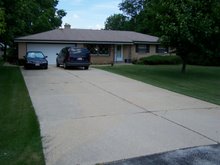Recently I've been spending more time working on my BBQ recipes - pulled pork, ribs, etc. Not just thrown on the grill, but in a slow-cooking smoker, designed to cook the meat at a low temperature for upwards of 18 hours.
Yum-diddiley-scrumptious!
While looking at recipes and methods online I noticed a lot of information on grinding my own meat for sausage patties, brats, links, etc. This seemed like an interesting thing to try, because I like to make sausage patties for breakfast on the weekends, but they're always expensive (I'm cheap) and you're never quite sure what is in 'em.
So I found a couple of promising recipes and picked up a meat grinder.

It's the old-style crank, and not motorized. I figured if I like how they turn out and I start making and freezing the sausage I can always upgrade later on.
After the first trial run, I'm surprised at how well it works and how good the sausage is. If I buy the meat in bulk it will cost me 30% less to make my own sausage and control the ingredients. I usually buy pork shoulder for $1.50 a pound in 14-18 pound bulk packages for making BBQ, so no problem there.
The first batch I made is pork, salt, cayenne pepper, rubbed sage, black pepper, crushed red pepper, coriander, and Accent (MSG). No other preservatives, additives, finger nails, or fillers. Accent is the only semi-questionable ingredient, and I'm going to do some tests to see if it tastes the same without it. If so, it's gone, too. I'm also planning to experiment with how much fat is in the mix. Pork shoulder is very fatty, and ground sausage is usually very fatty too. If I can use less and still get good results, so much the better!
First taste test confirmed that it's a very tasty recipe. The sausage patties aren't all perfectly round and even like the store-bought stuff, but who cares? It'll all look the same at the end of the day...
I plan to try grinding my own hamburger soon. Those who have done so often swear by it, as you can control what cuts are used, the amount of fat, etc.





